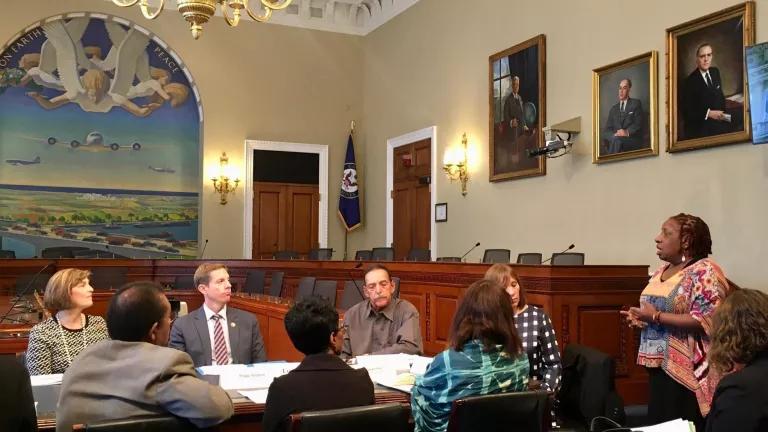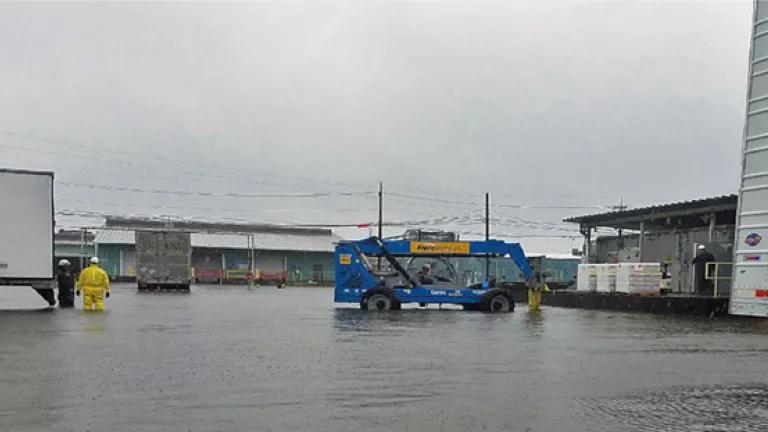The Promise of the Environmental Justice for All Act
The Environmental Justice for All Act is an essential federal legislative effort to begin remedying the long history of environmental racism and injustice in the United States.

Michele Roberts, National Co-Coordinator of Environmental Justice Health Alliance for Chemical Policy Reform, speaks at a briefing at the U.S. Capitol in 2019.
The Environmental Justice for All Act (EJ for All Act) is an essential federal legislative effort to begin remedying the long history of environmental racism and injustice in the United States, including the cumulative and disproportionate pollution burdens threatening communities of color, low-income communities, and Native/Indigenous nations and communities across the country.
Importantly, this landmark bill has been developed in close partnership with leaders in the environmental justice movement. The extensive public input process that informed the EJ for All Act’s creation has produced legislation uniquely shaped by the same people and communities that will benefit directly from its policy improvements. Accordingly, the EJ for All Act recognizes that meaningfully improving the lives of Black, Indigenous, and People of Color requires transformative change led by those on the frontlines. As described by Michele Roberts, National Co-Coordinator of the Environmental Justice Health Alliance for Chemical Policy Reform, “This is legislation that our affiliates see themselves in.”
NRDC strongly supports the EJ for All Act’s central elements, which are important steps toward remedying a long legacy of harm and ensuring the fair treatment and meaningful involvement of all people – regardless of color, culture, national origin, or income – with respect to the development, implementation, and enforcement of health and environmental laws, regulations, and policies.
One key component of the EJ for All Act is the strengthening of the National Environmental Policy Act (NEPA), a law that has provided the foundation for public participation in federal government actions since it was enacted in 1970. Section 14 of the EJ for All Act will help fully realize NEPA’s potential to be a powerful tool for environmental justice, by requiring federal agencies to provide early and meaningful community involvement opportunities for proposed projects that may affect an environmental justice community. To advocates like Dr. Mildred McClain, Executive Director of the Harambee House in Savannah, Georgia, this “makes possible the assurance that frontline and fenceline communities will always have a seat at the decision making table.” The EJ for All Act also requires federal agencies proposing an action that has the potential to cause negative environmental or public health impacts on an environmental justice community to prepare a Community Impact Report. A Community Impact Report will assess whether the proposed action will exacerbate or contribute to adverse health outcomes for that community, including historical patterns of exposure and cumulative effects, even if those effects are not within the control of the agency performing the assessment.
Another significant aspect of the EJ for All Act is Section 7’s requirement that federal agencies consider cumulative impacts in Clean Air Act (CAA) and Clean Water Act (CWA) permitting decisions. The failure to consider cumulative impacts is a longstanding and egregious oversight in environmental regulation and policymaking. It ignores the lived reality of frontline communities, who often face multiple environmental threats at once, alongside social stressors such as racial discrimination, historical trauma, and reduced access to material resources. A cumulative impacts burden, such as the one faced by West Virginia communities and described by Kathy Ferguson, Interim Executive Director of Our Future West Virginia, is unfortunately not unique: “Communities from around the state have endured toxic chemical explosions and leaks into our air, hazardous runoff from coal mining and fracking into our waterways, faulty corrosive tanks that lead to a critical contamination of our water supply, grounds filled with contaminants like fly ash and other seeping poisons. These occurrences are on top of the steady drip of routine hazardous emissions and ‘allowable’ pollution.”
The science shows that the risks from environmental pollution are heightened when a person or community faces multiple threats and stressors. The EJ for All Act’s proposal to account for cumulative impacts in CAA and CWA permitting is fundamental to reducing inequities and ensuring that additional burdens are not heaped upon those already experiencing disproportionate environmental and social vulnerability.
The bill also strengthens the Civil Rights Act of 1964 by restoring the right of individuals to sue in federal court for discrimination based on race, color, or national origin, whether the discrimination is intentional or creates a disparate impact – defined as an action or practice that, even if appearing neutral, actually has the effect of subjecting persons to discrimination. Providing this recourse will help make progress toward correcting the unequal pollution burden and stark environmental health disparities that fenceline communities experience due to historic and ongoing structural discrimination. As Delaware State Representative and Delaware Concerned Residents for Environmental Justice member Larry Lambert describes, "Growing up in Claymont, neighbors in Knollwood were used to seeing a thin layer of steel dust on their cars in the morning and feeling it in their lungs. This bill, especially the sections about cumulative impacts and civil rights, is critical to legacy communities like mine because the laws on the books are not protecting us from environmental racism poisoning our families."
The EJ for All Act is ambitious because it must be. It responds to the scale of challenges environmental justice communities face every day in their fight for clean air, clean water, and a healthy and safe environment. It is a long overdue correction to our nation’s failed chemical management policies, and the cumulative hazards and disproportionate harms that have resulted for communities of color, low-income communities, and Native/Indigenous communities.
NRDC looks forward to working with our environmental justice community partners, Representative Grijalva, Representative McEachin, and the other co-sponsors to move this legislation forward and begin correcting the long history of environmental injustice in the United States.




